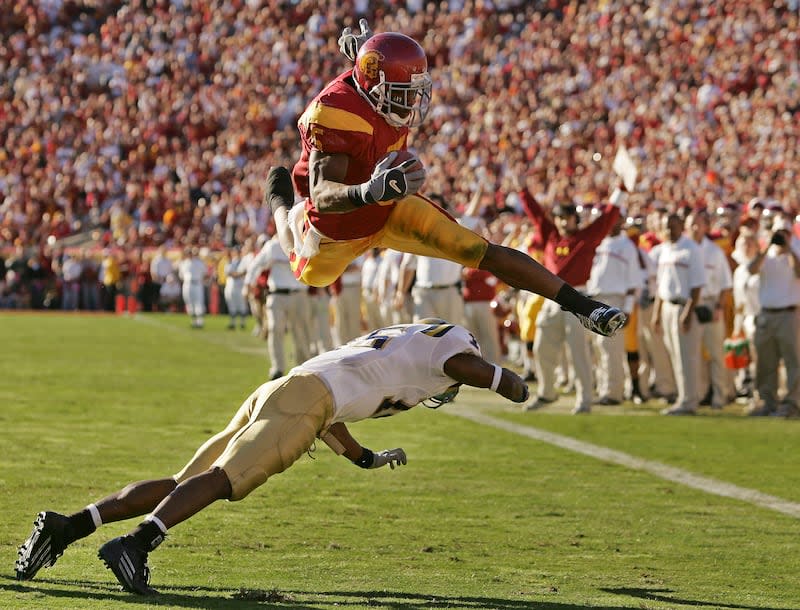Wait, what? Reggie Bush is getting his Heisman back?

Wait a minute, stop the party. Put the celebration on hold. What do you mean they’re reinstating Reggie Bush’s Heisman Trophy and granting him a pardon for his NCAA “crimes” — 14 years later?
Just like that, all is forgiven — the acceptance of “impermissible benefits,” the violation of “amateurism,” the acceptance of money and gifts from agents hoping to represent him. Bush surrendered his trophy when all this came to light in 2010, five years after he won the Heisman, and his USC team was stripped of the 2004 national championship.
Now the Heisman Trust (which technically is not connected at all to the NCAA) is returning the trophy, and not because he was found innocent of wrongdoing. See if you can follow the reasoning:
“We considered the enormous changes in college athletics over the last several years in deciding that now is the right time to reinstate the Trophy for Reggie,” said Michael Comerford, president of The Heisman Trophy Trust.
“Recognizing that the compensation of student-athletes is an accepted practice and appears here to stay, these fundamental changes in college athletics led the Trust to decide that now is the right time to return the Trophy to Bush.”
This was greeted with elation from every corner of the sports world, especially the media. They all repeat the same rationale: The rules were unfair at the time and the violations he committed are no longer NCAA crimes.
What does that have to do with it?
Pay-for-play is allowed today, and the outdated, misguided concept of amateurism has been destroyed, but none of this was the case 14 years ago. No one outside of the NCAA ever thought the rules of the day were fair or right — not then, not now — and almost everyone believed Bush’s punishment was harsh, but those were the rules at the time, the rules that everyone had to live by. Except, apparently, Bush.
In those days “student-athletes” ran afoul of the NCAA if they accepted a free pizza from a coach. The Bush case went a little further. It was alleged that agents gave Bush’s parents a rent-free house; one agent, claiming the Bush family had accepted cash payments, sued the football player for $300,000 (the suit was settled).
If they’re going to restore Bush’s Heisman Trophy, it follows that USC’s national championship will have to be restored, since it was based on Bush’s cash grab — legal by today’s standards. If they’re going to retroactively apply today’s rules, where will it end?
SMU received the so-called death penalty for maintaining a slush fund through boosters that was used to pay players secretly. An NCAA investigation reported that 13 players were paid a total of $61,000 during the 1985 and 1986 seasons. SMU was forced to cancel the 1987 and 1988 football seasons, and the program was stripped of 45 scholarships (later increased to 55). Nowadays, that $61,000 would be considered spare change. Nothing can be done to restore those lost seasons, but, based on the reasoning in the Bush case, the NCAA should apologize and pay the school for the lost revenue of those lost seasons.
The NCAA vacated Michigan’s appearances in the 1992 and 1993 Final Fours and ordered the school to “disassociate” from four players because they had received more than $600,000 from a booster. There are at least 22 college athletes who receive more than $1 million annually through NIL, according to On3. Therefore, in today’s everything-goes world of college sports, those Final Four appearances should be restored.
The NCAA’s Draconian reign over college athletics ranged from the serious to the petty (which is probably why college rules have swung so far the other way now). The NCAA penalized Utah because then-basketball coach Rick Majerus bought some meals for players, including a pizza for All-American Keith Van Horn after the latter’s father had died. Will the NCAA reverse penalties against the university?
Georgia Tech’s victory in the 2009 ACC championship game was vacated because the athletic department “hindered” an NCAA investigation into a case in which (the late) Demaryius Thomas received a whopping $312 worth of clothing. Will the NCAA reinstate the victory since that’s permissible in today’s NIL world?
If the world of college sports wants to retroactively apply today’s rules for yesterday’s “crimes,” they’ve got a lot of work to do.


